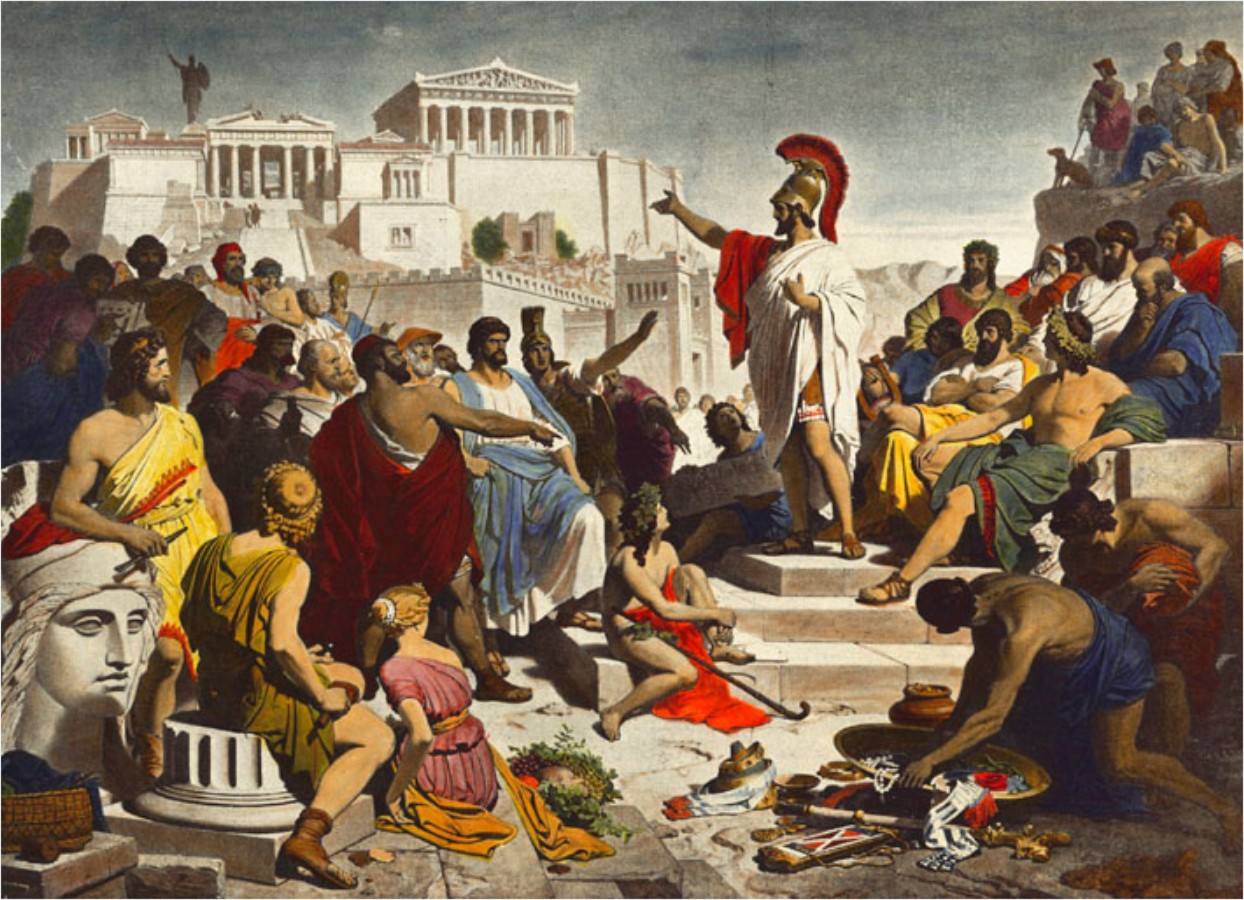
The Greeks are well suited for helping us to think about the complexity of the Middle East’s political future because they began their political journey influenced by the civilizations of the ancient Near East, found ways to innovate politically and faced some of the same internal divisions Middle Eastern societies confront.
There are many important approaches to thinking about the Middle East well underway in the public domain, but the use of ancient history to conceptualize contemporary problems in the region has generally not been among them. Scholarly aversion to anything that hints at “Orientalism;” a modest and often shrinking presence within the academy of classics and other disciplines associated with the study of antiquity; a new turn to algorithms and massive data sets; and the general dominance of social science methods in our approach to the region—all have left the study of ancient history on the sidelines of strategic thinking about the contemporary Middle East. The extent of upheaval in the Middle East though requires a reconsideration of these intellectual strictures. It is not sufficient to approach the ferment in the region with only the intellectual tools and constraints of the last century—an era that in many respects no longer exists.
The revival of ancient history as an analytic tool offers the possibility for thinking in new ways about the role of the United States in the region by mapping the ancient communities, identities, and patterns which U.S. policies and actions will inevitably affect. The United States has been engaged in the Middle East since its early nineteenth-century wars with the Barbary pirates, inheriting much of the political and military influence of a collapsing British empire, confronting Soviet regional ambitions in the Cold War and eventually serving as guarantor of the region’s supply of oil to global energy markets. Throughout these two centuries, the United States has rarely had to face directly the complexity of the region’s internal political and religious culture. No longer.
The echo of ancient patterns and precedents has already been audible in the region’s political and cultural trends in the post-Cold-War era. An Arab Egyptian president in 2002, for example, recreated the Library of Alexandria of the third century BC and invited the world to attend its grand opening. Saddam Hussein named his elite Republican Guard divisions after Babylonian kings. The Khorasan region of eastern Iran and western Afghanistan, where the revolt against Umayyad rule in the eighth century began, became a brand label for contemporary Islamic extremists.
The examination of the ways in which the past echoes into the present in the Middle East is to take history as seriously as the peoples of the region do. It means showing deference to the possibility of diverse ways of political organization and expressions of religious identity that are indigenous to the region and not always fully discernible with an analytic tool kit that privileges the political assumptions and analytic methods of the post-Enlightenment world. An analytic method that takes ihtiram (“respect” in both Arabic and Persian) as a starting point also might lead to understanding and policy outcomes for the United States that can endure in the region.
The path the Greek world took to arrive at the rule of law and the placing of sovereign power in a popular assembly—albeit of limited male membership—is a tale of kings, aristocrats, blood feuds, persistent conflicts, religion, and only gradual progress toward a stable and freer order governed by law. It is a story of the difficulty of building and maintaining a social compact amid differing groups and coping with foreign influence and invasion. It is a world that would be familiar to the inhabitants of the Middle East today who rebelled against undemocratic rule in the mostly ill-fated “Arab Spring,” became subject to foreign military intervention and fell into various degrees of internecine conflict. The struggle to emerge from conflict by creating institutions that can mediate and claim the allegiance of citizens over tribes and sects was central to the Greek political experience and makes that experience conceptually powerful for understanding the challenges of political development in the Middle East.
Homer is always a good place to begin. The Iliad’s description of the Greek military camp along the shores of Troy includes political processes and nascent institutions that are helpful for conceptualizing change in the contemporary Middle East. This political community—not quite city-state—has political elements of the Greek Bronze Age of Mycenaean kings, the armed aristocracy of the archaic age of the eighth century BC and a foreshadowing of the democratic Greek polis of the classical fifth century BC. In Homer’s poetic conception, the community of Greeks inhabit simultaneously multiple political phases of past, present and future. This is a useful way to also think strategically about the politics of the contemporary Middle East.
Across the region, past identities of religion or empire blend with modern political institutions, ideas and technologies to hint at nascent political futures. Turkey, for example, is at once heir to European ideas and practices of secular nationalism, republican government and industrialization and to the Middle East’s Ottoman Caliphate and Sultanate, Central Asia’s nomadic Steppe warriors and ancient civilizations that projected influence in the Middle East. In Egypt, the patterns and precedents of Egypt’s ancient and medieval histories present a unique combination of political stature, Islamic scholarship and ties to the West that could position Egypt to lead the development of new political thinking in the Arab world. Throughout the region, Islamic extremists, for their part, embrace early medieval battlefield successes to define modern political and territorial goals and rely on the tools of the digital age to achieve such aims.
Like Homer’s proto-Greek city-state encamped along the shores of Troy, political actors are operating in more than one time and space, making their actions difficult to assess on a single political continuum. The political bargains forged in the aftermath of the Ottoman Empire and the dominance of European ideas and institutions that pervaded the region through most of the twentieth century have given way to a transitional period that defies—like Homer’s Greek encampment—a single branding.
Just as we can see in the Greek encampment the seeds of the developed polis so too we can look now for the ideas and institutions that could emerge from the current conflicts to forge new social compacts. Like the Greeks on the shores of Troy, the Middle East’s inhabitants today represent the messy beginning of a political process whose future is potentially visible in the contours of the present. We need to look for it with the aid of a conceptual framework for politics that comes from the archaic age of Greece and the literary imagination of Homer. The past, present and future are again all in play.
Ancient Athens, like the Arab world of today, faced the daunting task of forging a social compact on more than just dominant family groups. The Athenian solution was equivalent to an ambitious redistricting program that created ten new tribes, each of which drew members from the city of Athens, coastal areas and the rural interior. Politics was no longer tied to dominant local families from one geographic region. Instead, newly diverse tribes had to forge a common set of interests when each new tribe’s constituent members were drawn from different regions. The unifying political idea of Athenian citizenship emerged from the creation of inclusive political institutions that transcended narrow allegiances.
The reforms in Athens provide a conceptual framework for thinking about how states in the Middle East—especially the secular nationalist regimes that have lost their social compacts—can bind in a single state disparate religious and ethnic groups by creating a political identity that is larger than the sum of its parts. The Athenian political project helped create what in modern times we would recognize as an Athenian nationalism—an identity which all Athenian citizens would accept and accord preeminent political allegiance. The analytic challenge for observers of the contemporary Middle East is to identify how—in a political environment that looks backward and forward simultaneously—states can establish reforms to bind fragmented political communities into stable, well-functioning states.
In harnessing Homer and Aeschylus to conceptualize the political landscape of the contemporary Middle East, one might be accused of committing the error—political and intellectual—of imposing Eurocentric frameworks on the region’s troubles. Yet the work of scholars since the late nineteenth century in deciphering texts in Akkadian, Hittite and other ancient Near Eastern languages has demonstrated that the literatures of the ancient Near East have strong parallels with Greek epic and other Greek literary forms. These parallels, alongside the demonstrated trade linkages and transportation corridors between West Asia and the Greek world, raise the possibility that the ancient Greeks absorbed substantial influences from ancient Near Eastern literature.
Allowing insights from the ancient world to inform our analysis is to recognize the mixing of ideas in ancient international literary currents from the Near East and not to imply or assert the primacy of the Greek corpus over the Near East’s own traditions. Homer and Aeschylus offer useful conceptual frameworks for the contemporary Middle East because they permit us to think beyond our traditional analytic frameworks. They are among the authors who may have been overlooked in most contemporary analysis of the region because of their association with the Western literary tradition and because of a reluctance to open the door more broadly to a renewed study of the ancient world and its relevance to the modern Middle East.
A final conceptual challenge associated with the forging of new social compacts will be how to think about the region’s political geography—again, ancient perspectives can inform our analysis. The quest for new social compacts will not only entail the multilayered political process that the Greek encampment in the Iliad invites us to contemplate, the redistricting methods of Athens to build a wider political identity, or the pursuit of the rule of law that Aeschylus exhorts. The renewal of social compacts will also require a reckoning with the underlying geographic boundaries of the Middle East and the patterns of settlement and political community that have attended these divisions since antiquity. This ancient physical map helps us understand the constituent parts of any political order. Where rivers flow, where rain falls, where mountains rise and where deserts divide influence early settlement and subsequent national identity and will, in turn, affect the renewal of social compacts.
Written by Andrew Skitt Gilmour
Image: Wikimedia Commons
Publication date: October 17, 2019
Learn about civil society in MENA
MENA’s first free click-to-donate platform – you click, we donate




Copyright © 2024 The Olive Tree SAL, all rights reserved. Terms of Use | Privacy Policy